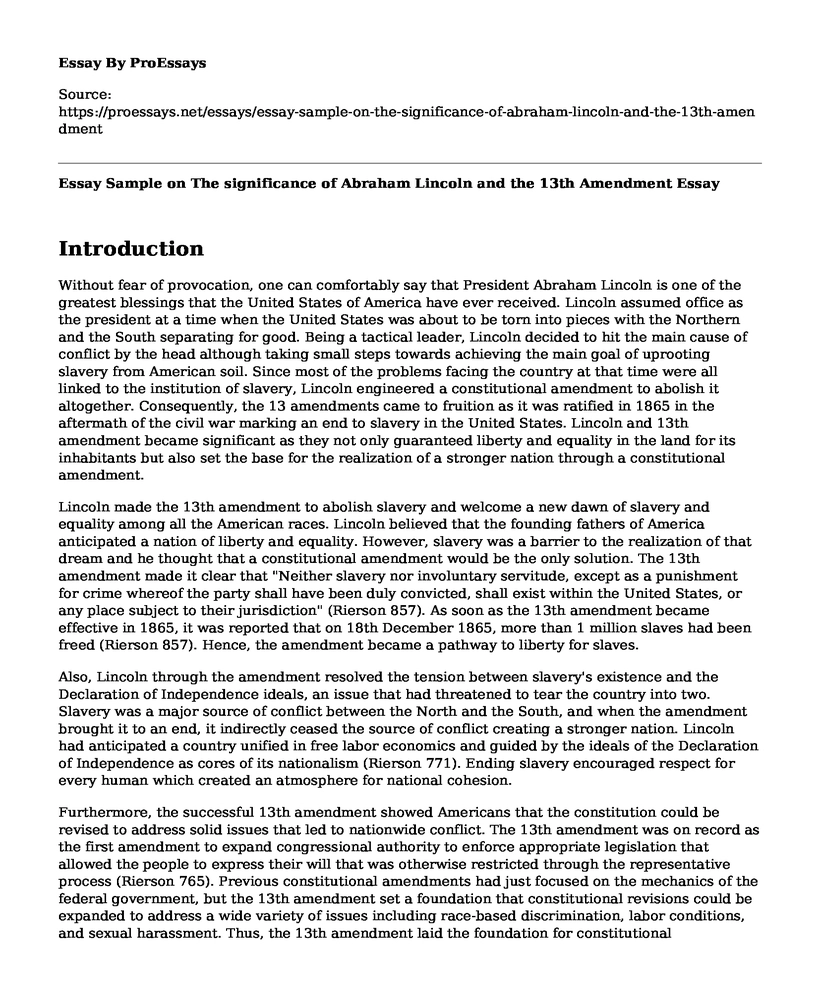Introduction
Without fear of provocation, one can comfortably say that President Abraham Lincoln is one of the greatest blessings that the United States of America have ever received. Lincoln assumed office as the president at a time when the United States was about to be torn into pieces with the Northern and the South separating for good. Being a tactical leader, Lincoln decided to hit the main cause of conflict by the head although taking small steps towards achieving the main goal of uprooting slavery from American soil. Since most of the problems facing the country at that time were all linked to the institution of slavery, Lincoln engineered a constitutional amendment to abolish it altogether. Consequently, the 13 amendments came to fruition as it was ratified in 1865 in the aftermath of the civil war marking an end to slavery in the United States. Lincoln and 13th amendment became significant as they not only guaranteed liberty and equality in the land for its inhabitants but also set the base for the realization of a stronger nation through a constitutional amendment.
Lincoln made the 13th amendment to abolish slavery and welcome a new dawn of slavery and equality among all the American races. Lincoln believed that the founding fathers of America anticipated a nation of liberty and equality. However, slavery was a barrier to the realization of that dream and he thought that a constitutional amendment would be the only solution. The 13th amendment made it clear that "Neither slavery nor involuntary servitude, except as a punishment for crime whereof the party shall have been duly convicted, shall exist within the United States, or any place subject to their jurisdiction" (Rierson 857). As soon as the 13th amendment became effective in 1865, it was reported that on 18th December 1865, more than 1 million slaves had been freed (Rierson 857). Hence, the amendment became a pathway to liberty for slaves.
Also, Lincoln through the amendment resolved the tension between slavery's existence and the Declaration of Independence ideals, an issue that had threatened to tear the country into two. Slavery was a major source of conflict between the North and the South, and when the amendment brought it to an end, it indirectly ceased the source of conflict creating a stronger nation. Lincoln had anticipated a country unified in free labor economics and guided by the ideals of the Declaration of Independence as cores of its nationalism (Rierson 771). Ending slavery encouraged respect for every human which created an atmosphere for national cohesion.
Furthermore, the successful 13th amendment showed Americans that the constitution could be revised to address solid issues that led to nationwide conflict. The 13th amendment was on record as the first amendment to expand congressional authority to enforce appropriate legislation that allowed the people to express their will that was otherwise restricted through the representative process (Rierson 765). Previous constitutional amendments had just focused on the mechanics of the federal government, but the 13th amendment set a foundation that constitutional revisions could be expanded to address a wide variety of issues including race-based discrimination, labor conditions, and sexual harassment. Thus, the 13th amendment laid the foundation for constitutional amendments that followed later to expand the enjoyment of liberty and equality among people of different genders, race, and ethnicity. For example, the 15th amendment allowed black Americans the right to vote.
Conclusion
Lincoln and the 13th amendment to the constitution established a roadmap for the attainment of personal liberty and equality for all races in the United States. The amendment also ended the chronic issue of slavery that had threatened to tear the nation apart leading to a more united nation that America is today. The amendment became a foundation for constitutional revisions to allow for the inclusion of human rights and freedoms that ensured every citizen enjoyed equal rights.
Works Cited
Rierson, Sandra L. "The Thirteenth Amendment as a Model for Revolution." Vt. L. Rev. 35 (2010): 765.
Cite this page
Essay Sample on The significance of Abraham Lincoln and the 13th Amendment. (2022, Nov 08). Retrieved from https://proessays.net/essays/essay-sample-on-the-significance-of-abraham-lincoln-and-the-13th-amendment
If you are the original author of this essay and no longer wish to have it published on the ProEssays website, please click below to request its removal:
- Analysis of the Affordable Care Act - Essay Sample
- Essay Example on Torquatus: A Defiant Epicurean in the Reign of Caesar
- Essay Sample on Colonization of Niger by Europeans in 19th Century
- Athens Defeats Persia in First Persian War - Essay Sample
- Essay Example on the US: A Superpower Playing a Major Role in Global Politics
- White Nationalism: The Need to Fight Inequality - Essay Sample
- Essay on Andreesen Horowitz: Investing in the Future of Technology & Innovation







